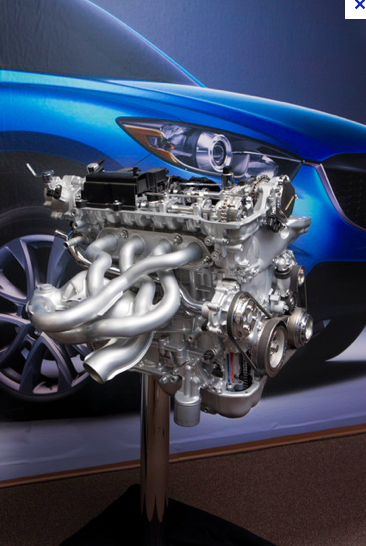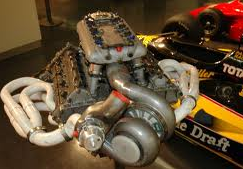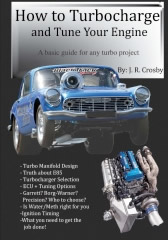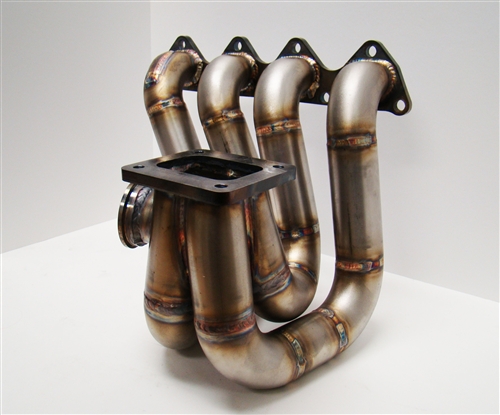| What's Hot! | Products/ Tools | EFI Tuning | Basic Tuning | Advanced Tuning | Chassis Tuning | Advertise with us |
Long tube vs Short tube header manifold Design
A look at how the design of a tubular or log based manifold effects performance of an engine, turbocharged or N/A.
Contributed by: Enginebasics.com
In a previous article we discussed building a turbo manifold. We talked about the pro’s and con’s of different types of manifolds from log manifolds, to tubular. In this article we are going to take a closer look at the importance of runner length.

Recently Mazda has released a new turbocharged motor with technology called “Sky Technology”. While this motor has many innovations that improve efficiency, one of them is the motors high compression ratio. At 14:1 running on pump gas it is quite amazing. Recently the motor was released in the U.S. but sadly the compression ratio was dropped to 13:1. When asked about why the compression was dropped for the American version Mazda said: “We were unable to fit the long tube turbo header on the American versions causing us to have to lower the compression”. REALLY…..so manifold design plays a pretty big roll in not only exhaust flow but many other things as well.

How tuning of manifold runner lengths changes things:
1. How responsive the turbocharger is.
2. How much exhaust reversion the engine experiences.
3. Exhaust flow.
Lets take some time to talk about each of these topics:
1. How responsive the turbocharger is
The longer the manifold runner length, the more area that needs to be filled by exhaust gasses to build the pressure and heat required to spin the turbine of the turbocharger. Short tube header manifolds, with their small runner areas are excellent at transferring the energy of the combustion of fuels in the engine to the turbine. This allows the turbo to spool several RPM sooner than a long tube manifold.
2. How much exhaust reversion the engine experiences.
One of the problems with short runner length manifolds is that they suffer in the power department when it comes to all out peak HP. This is mainly due to something called exhaust reversion. Exhaust reversion is when exhaust heading out of the combustion chamber in the exhaust manifold reverses direction, and heads back towards the combustion chamber. This causes exhaust gases to not completely evacuate the cylinder. The cylinder will therefore have not only less room for clean air and gas to enter the chamber when the intake valve opens, but also that air will be hotter and more prone to pre-ignition and detonation. Longer tube manifolds help to keep the exhaust gases flowing in the right direction and don’t allow reversion from cylinders to other cylinders. One of the huge benefits of a twin scroll divided set-up is that it pairs exhaust runners who are 180 degrees apart from each other in their firing order together. This cuts WAY down on exhaust reversion. For example, on a four-cylinder motor you would pair cylinder 1 with 4 and 2 with 3.
3. Exhaust flow
Longer tube headers before the turbo allow for more area before the restriction of the turbine wheel of the turbo. This added area allows for more expansion and flow of the hot exhaust gases. This increase in area provides you flow just like going from a 2” to 3” exhaust ads exhaust area and gains exhaust flow.
4. Detonation Suppression
Longer tube headers allow for more exhaust flow and hinder exhaust reversion. This helps in controlling combustion cylinder temperatures by allowing more area for fresh cool air to enter the combustion chamber. Since cylinder temperatures directly correlate to detonation, it is important to keep them as cool as possible.
Long tube vs short tube turbo header design
So it looks like you have choices to make when it comes to designing or picking out a turbo manifold. The length and design of the manifold will greatly control the responsiveness of the turbo, and the compression or ignition timing you will be able to run without causing detonation or pre-ignition. Short tube headers will provide a fast responsive turbo, while a long tube header, like the one on the Mazda sky motor, will allow you to run higher compression, more advanced timing, and have higher exhaust flow. There is no best option here as it really depends on what you’re going for with your set-up. Whatever you choose, now you can make an educated decision for your goals.
ATTENTION READER:
If you enjoyed the information and article you just read be sure to check out our newly released book with even more exciting photo's and information:How to Turbocharge and Tune your Engine

Want to know more about your particular Make and Model vehicle? All of these vehicles are covered in the tech, maintenance and repair articles found above. Enginebasics is the wiki or wikipedia of car part, repair, how to and tuning information. Let us be the class 101 for your automotive learning.
| Ford | General Motors GM | Pontiac | Jaguar | Land Rover | Nissan |
| Toyota | Honda | Lexus | Acura | Lotus | Scion |
| Infinity | BMW | Mercedes | Mitsubishi | Ferrari | Maserati |
| Lamborghini | Volks Wagen VW | Saab | Audi | Hyundai | Kia |
| Subaru | Mazda | Chevy | Volvo | Caddilac | Dodge |
| Chrylser | Daewoo | Porsche | Mercury | Freightliner | MG |
Individual Models
| Ford Mustang | Mitsubishi Eclipse | Mitsubishi Evo | Subaru WRX / STI | Dodge Viper | Chevrolet Corvette |
| Nissan Skyline | Honda S2000 | Nissan 350z | Toyota Supra | Chevy Camaro | Lotus Elise Exige |
| Honda Civic | VW Golf | Dodge SRT-4 | Eagle Talon | Acura Integra | BMW M3 |
| Nissan 240sx | Porsche 911 | Acura NSX | Honda Accord | Toyota Camry | Toyota MR2 |
| VW R32 | Dodge Truck | Mazda Rx7 | VW Jetta | Sand Buggy | Nissan Sentra |
For the latest Automotive news and stories visit the websites below |
Our feature Build: An AWD V6 Civic





